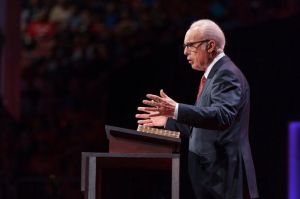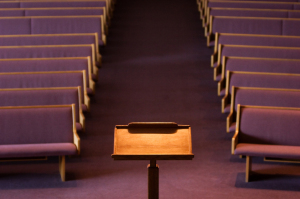Interview: Richard Myers -- Looking Back at Terri Schiavo
Ten weeks have passed since Terri Schiavo died amid a media and legal frenzy that opened up questions regarding the right to live -- or to die.
During a panel discussion at the latest University Faculty For Life (UFL) Conference, several speakers gave different perspectives on the controversial Schiavo case.
One of the speakers at the panel was the incumbent president of UFL, Dr. Richard Myers.
Myers, a Catholic and a Professor of Law at Ave Maria School of Law, gave legal perspective as well as biblical standpoints on the controversial case, during a brief interview with the Christian Post on June 13.
From lawyer’s seat, what is the legal standpoint of the Schiavo case?
The Schiavo case is in a sense not very unusual because the legal precedent that authorizes the withdrawal of feeding for patients like Terri has been in place for ten or fifteen years now. What is unusual about the Schiavo case is the fact that this came to public attention and caused such a stir. Because this happens with some frequency in the country the case wasn’t very distinctive and was sometimes described by some people as a run-of-the-mill case.
The more exceptional aspect of it was that it caused controversy and opened people’s eyes to this practice that has been going on now for ten to twenty years in the country of withdrawing treatment from patients based on the idea that their lives aren’t really worth living. And that is such a dangerous concept to be introduced into the law sort of in a subtle, hidden way that the Schiavo case and all the public attention it has received may helped to some rethinking of that issue.
What are some of the contributing factors for this particular case to become so controversial?
There are several and one could be that most of the times when this happens in a country where the feeding is withdrawn, the family, the hospital and the healthcare workers are in agreement so it just happens without any legal scrutiny or it just happens because there’s no dispute about it. The only times when this comes to public attention is when there’s a family disagreement about the appropriate course of action to be taken with regard to a patient. Most of the times, families are in agreement about what will happen. Although that still may obscure the underlying issue that what they’re in agreement that the person ought to be starved to death. Even if families are in agreement about that, we shouldn’t approve of that kind of choice. In this case, there was a family disagreement between Terri’s husband and her parents and so we had adversary litigation over the issue.
What was new in this case is the internet and blogging - all of that have made it easier to disseminate information, letting the case come to the attention of pro-life groups and disability right groups. Then the case turned out to be a big issue in those circles, generating a lot of opposition to what was happening to Terri. That whole angle on it was something that couldn’t have happened easily ten years ago or so.
I think that it was a combination of things that the issue became such a big one in the pro-life and disability communities. The main issue is that there was a disagreement in the course of treatment other wise; these are instances of euthanasia by omission that they go on frequently in the country where family wants to go along with it – the reason why it doesn’t attract much public attention.
What is the main issue with all the concern and opposition raised by so many Christians regarding the case?
The main issue why so many Christians were concerned about the case and protesting that course of treatment is what the case reflects - the battle between sanctity of human life as opposed to an approach to human life where the value is only based on the quality or ability to contribute something. In fact, a lot of people who were in favor of withdrawing Terri’s food and water viewed her as a non-person because she didn’t have the ability to interact with her surroundings, or at least not in a great ability and her life was of such a low quality that they didn’t view it as valuable.
What is the biblical perspective on the case?
Both the Old Testament and the New Testament reflect this reverence for life and sanctity of life and sometimes you’ll hear God’s phrase quoted from Exodus. The statement “I set before you life and death, choose life” is frequently quoted by the pro-life movement as expressing this reverence and sanctity of human life that ought to be respected in all its stages and forms even if it’s severely disabled.
There is a plenty of other references such as the way the late Pope John Paul II had taught the Gospel, setting forth the teaching that he phrased “the Gospel of life.” It’s a theme that runs throughout both the Old Testament and New Testament that there is value in human life that ought to be respected certainly by the state, but also by all of us and that human life is deserving of respect even if it’s in a severely disabled condition.
We have value because we’re children of God and that value doesn’t depend on whether we’re disabled or brilliant or whether we’re wealthy or poor. We have value as creatures of God and that dignity is something that ought to be respected by law even if we’re in a disabled condition. That’s why people that take the Bible and their faith seriously were so upset by the way Terri was being treated and the way people thought her life was disposable because it was of insufficient quality. If you have a biblical perspective on this, you recognize that as creatures of God, we all have a value and dignity that ought to be respected by the law and one another.
Richard S. Myers is Professor of Law at Ave Maria School of Law. A graduate of Kenyon College, he earned his law degree at Notre Dame, where he won the law school's highest academic prize. He began his legal career by clerking for Judge John F. Kilkenny of the United States Court of Appeals for the Ninth Circuit.
Myers also worked for Jones, Day, Reavis & Pogue in Washington, D.C. where worked on several cases before the United States Supreme Court. He taught at Case Western Reserve University School of Law and the University of Detroit Mercy School of Law before joining the Ave Maria faculty.
He is a co-editor for several Catholic publications and has also published extensively on constitutional law in the law reviews of Catholic University, Case Western Reserve University, Notre Dame University, and Washington and Lee University.
Myers also serves as Executive Secretary of the Society of Catholic Social Scientists.




























